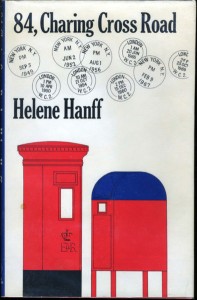Books that Make Me Want to Write Letters
 The old-fashioned kind, with paper and stamps and fountain pens, even scratchy-nibbed ones.
The old-fashioned kind, with paper and stamps and fountain pens, even scratchy-nibbed ones.
You can blame this list on Colleen Mondor at Chasing Ray, who recently compared John Hall’s Correspondence to 84, Charing Cross Road:
“…in that it’s an epistolary novel about books but it’s much more informative. A retired bank clerk finds a cache of letters from his great great grandfather from Dickens, Eliot, Thackeray, etc and enters into an email correspondence with Christie’s about selling them. Over the course of the months that follow he not only learns more about his ancestor but the literary greats themselves. As someone who never spent time with literature before it’s all a bit of a brave new world and he enjoys seeing what he missed. I liked all of that – a lot actually – it was only in the end that it sort of dropped off a bit. I thought there was a real friendship between the retiree and Christie’s seller he’d been emailing but it’s almost like Nash wasn’t sure how to end it. (Of course CHARING CROSS ROAD is the model for perfect endings -sad but brilliant.) Still a good read but a bit shy of wonderful.”
—Which immediately and overwhelmingly filled me with nostalgic affection for Charing Cross Road and for my first year in New York City. I don’t remember how I came across Helene Hanff’s wonderful collection of letters, but I first read it right after I moved to New York, and my early experiences there were highly colored by Hanff’s book. I remember taking it to Central Park and attempting to identify all the flowers she mentioned in the passage about the Shakespeare Garden.**
After Colleen’s post, I simply had to read 84, Charing Cross Road again, but I couldn’t find my old copy. The new (used) one arrived today, and it’s a wonder I am here writing at all—the first page swept me right back in. 1949, Saturday Review of Literature, underlined typewritten titles, a request-by-mail to an overseas seller of out-of-print books: it’s impossible not to read the opening letter without a wry awareness of the difference between the way Miss Hanff seeks to obtain her yearned-for old books, and the way I rapidly and effortlessly obtained my copy of hers. Click, click, click, and two days later a man in brown places a copy on my doorstep. Marvelously convenient, but no hope of the slowly unfolding relationship between thoughtful and humorous minds like the one that develops between Miss Hanff and the London bookseller. What we have instead, today, is this—an online community of booklovers, a set of relationships that develop over time in comment boxes. And you know I relish it, am glad to live in this particular now.
But oh! just savor—
Sir:
(It feels witless to keep writing “Gentlemen” when the same solitary soul is obviously taking care of everything for me.)
Savage Landor arrived safely and promptly fell open to a Roman dialogue where two cities had just been destroyed by war and everybody was being crucified and begging passing Roman soldiers to run them through and end the agony. It’ll be a relief to turn to Aesop and Rhodope where all you have to worry about is a famine. I do love secondhand books that open to the page some previous owner read oftenest. The day Hazlitt came he opened to “I hate to read new books,” and I hollered “Comrade!” to whoever owned it before me.
:::blissful sigh:::
Of course this got me thinking about other epistolary novels I have loved. The Guernsey Literary and Potato Peel Pie Society, obviously. Anne of Windy Poplars—not my favorite Anne book, and yet, for a certain stretch of years, one of my most frequently revisited novels. I loved Anne’s voice, given free reign in the letters, its warmth and humor. I know Montgomery went back and wrote Windy Poplars later, to fill in the gap between Anne of the Island (swoon) and Anne’s House of Dreams (the best Anne book next to Green Gables itself, not including Rilla of Ingleside in the comparison because that’s comparing apples and oranges, and they are both such delectable fruit)—but the sort of afterthoughtness of Windy Poplars in no way weakens it, and it’s inconceivable that P.E.I. could exist without a Rebecca Dew. (Who looks, by the way, in my mind’s eye, exactly like Guernsey Lit. Society‘s Isola. Or rather, Isola looks and sounds like Rebecca Dew—Canadian and British accents notwithstanding.)
What are your favorite epistolary novels?
Related:
Postscript
Letter from New York
